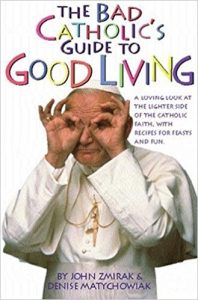Make Advent Meaningful: Think About the Pagan Alternatives
A thousand crotchety columns this week will point out that we mark Christmas too commercially and too early. And they’ll be right. Christmas is not just a day but a season of the Church’s liturgy. It begins on Christmas Eve. It continues through Epiphany on January 6. Really old-school Catholics will go on marking it through February 2, the date that marks Mary presenting Jesus in the Temple. Some folks won’t put up any lights till Christmas Eve, and won’t take them down till February 3.
I’m all for that, if you can sway your spouse and browbeat your kids into accepting it. I wrote a whole book, The Bad Catholic’s Guide to Good Living, to encourage people to explore ancient Christian customs that enrich and deepen our faith. And also for the pretext to come up with crackpot new customs like a “Potato Famine Party” for St. Patrick’s Day and a flambé feast for Pentecost.
But now I’d like to make an alternative suggestion. Something to make the season we’re entering now, Advent, more meaningful in itself. We gain nothing by pretending that Christmas starts on Black Friday, of course. Still, is there something more we can make of these upcoming weeks than just filler time in which we’re holding back from marking Christmas too early? I think there is. While we wait for the Redeemer, let’s try to remember what it means to be un-redeemed. Not just that, but irredeemable. Let’s try to remember what a Christless world was really like.
Advent Is a Time to Rediscover Paganism
Most of us are gentiles, grateful adoptees to the blessed family of Abraham. So our forebears dwelt in great darkness. All they had were their pagan cults.
One fruitful way to spend Advent would be to do some research (along with the kids) on the pagan religions that your ancestors once practiced. Not just the fun parts, like the wacky cosmogonies and action-packed myths. No, we should dig into what scholars can reconstruct of what pagans really thought about life. And the afterlife.
Did they believe that their gods demanded human sacrifice, like the Celts? And did they crown it with cannibalism, like the Aztecs? Did they think that small gods would work miracles for little bribes, cast curses onto their foes? Were they convinced that a stern, inexorable Fate decided all the outcomes in everyone’s life, regardless of merit? Were they sure that whatever progress we make will just be erased, ground fine in the tireless mills of endlessly repeated, meaningless cycles? Or was their whole worldview, like Hinduism, intertwined with cruel social injustice, its theology justifying the abuse of millions of “untouchables”?
Please Support The Stream: Equipping Christians to Think Clearly About the Political, Economic, and Moral Issues of Our Day.
Reading about these ancient creeds is exciting and fun at first. Their gods are so … unpredictable, aggressive, dramatic. What they aren’t is good. Not most of the time.
What If There are Gods Who Aren‘t Good?
We Christians get jaded. Spoiled. We take it all for granted: Of course the ultimate principle in the universe is a loving personal God who wants the best for us. (Just like every Hollywood movie has a happy ending. Yawn.) What a goody-two-shoes. He also expects so much.
Imagine instead a god or goddess who’d give you power and pleasure, in return for a bottle of rum or a slaughtered goat. The lure of paganism is perfectly obvious, if fallen. We’re doomed to work, but dream of magic. We don’t just want to watch stories of wizards and mages who command dragons with spells. No, we want to live them, through technology. Or ideology, which is politics, wielded as magical thinking. We want to ward off age, and death and suffering — not learn how to live them gracefully, with humble resignation. Even writing those pious words, some part of me wants to go out and carve a rune onto an oak tree.
Skeletons in December
So maybe that’s what we should do. Go raid your store of Halloween decorations. When you hang up that skeleton, tell the kids and remind yourself: For pagans, the dead weren’t really quite … dead. They never rested in peace, and from their shadowy half-existence they might well come back to demand things from us. That sad, even ghastly fate, awaits us too in just a few years. There’s no one to redeem us from it.
Put up some witches, and recall that they once terrorized whole communities with the power folks thought they had to blight wombs, spoil food, or turn infants blue in the cradle. I knew women from the Caribbean who lived in fear of Santeria spells. The sight of a stray cat dead in front of their homes in Queens would shut them inside, cowering in the dark.
Carve and light with candles a jack o’ lantern, and in its idiot smile see the frenzy and hunger of the gods.
Each Week, Light One More Candle Against the Dark
Then each week of Advent, after church, come back and take some of that down. And light one candle on the Advent wreath. And put up part of a Christmas crèche. Maybe one week the animals. The next week, the shepherds. Then the angels. Then Joseph and Mary.
As Christmas week begins, put in the manger. But leave it empty.
On Christmas Eve, lay the baby Jesus in His bed, giving thanks. Take down the last skeleton. The “great god Pan is dead,” and the loving Creator of the universe has become man.







